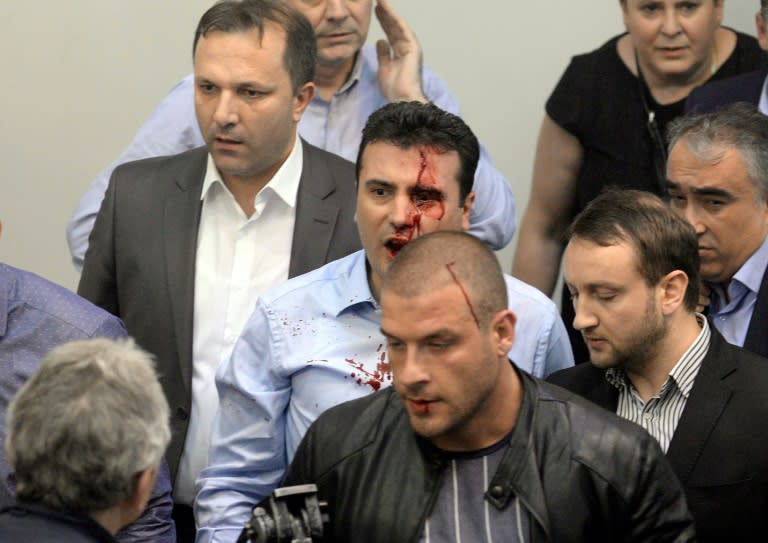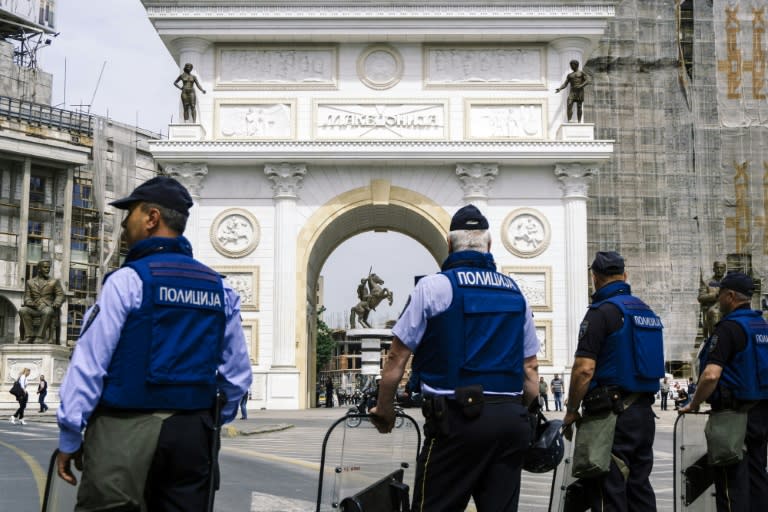Rivals trade blame over Macedonia parliament violence
Macedonia's rival political parties traded blame Friday for an eruption of violence in the unstable Balkan country's parliament which left about 100 people injured. The chaos in Skopje broke out on Thursday evening, with dozens of nationalist demonstrators -- including a group of masked men -- breaking a police cordon and storming parliament in anger over a vote for a new speaker, an ethnic Albanian. The riots, which came after two years of political crisis, drew widespread condemnation, with NATO and Turkish President Recep Tayyip Erdogan echoing the worries expressed by the European Union and Washington. "Acts of violence like those we saw yesterday must not be allowed to happen again," said NATO chief Jens Stoltenberg. Footage from the scene showed chairs being thrown as fistfights broke out in the parliamentary press room, while Zoran Zaev, leader of the opposition Social Democrats (SDSM), was among the bloodied MPs. An early election in December was supposed to end Macedonia's turmoil, but its inconclusive result only deepened the uncertainty and has led to nightly protests by nationalist demonstrators, who support the conservative VMRO-DPMNE party of former premier Nikola Gruevski. They oppose a proposed coalition between the SDSM and ethnic Albanian parties, which they perceive as a threat to national unity. The storming of parliament was sparked by a vote by the SDSM and Albanian groups for a new parliamentary speaker, Talat Xhaferi. While the EU said it took "positive note" of Xhaferi's election, the protesters considered the vote unlawful, taking place after the former speaker had closed the day's session. - 'Policy of hatred and division' - Condemning the violence on Friday, Gruevski said the SDSM and their allies had "knowingly decided to violate the law and the constitution, which directly caused the event that ensued". The SDSM said the speaker's election was "a major step" in the democratic process and blamed the violence on "a policy of conflict, hatred and division" brought on by the rule of Gruevski, who served as premier for a decade until last year. Although the SDSM reached a post-election deal with Albanian parties to form a coalition, President Gjorge Ivanov has denied Zaev a mandate, alleging national sovereignty would be undermined by a demand that Albanian be made a nationwide official language. Ethnic Albanians make up around a quarter of Macedonia's two million people. Ivanov, an ally of Gruevski, on Thursday appealed for calm and invited party leaders to his office on Friday, but the meeting did not go ahead after the SDSM and Albanian groups refused to attend. Ethnic Albanian party BESA said the interior ministry had "allowed VMRO-DPMNE hooligans to attack the highest legislative institution". - New protests - Police eventually took control of the parliament late Thursday, using stun grenades to clear out the protesters, but fresh street demonstrations began on Friday evening. Eight people were detained for questioning over the violence that led to MPs, journalists and police officers being injured, according to officials. Most of the injured deputies were from the SDSM party, but ethnic Albanian MP Ziadin Sela appeared to be one of the most badly wounded. "They were kicking him and hitting him with wooden batons. When they hit him in the face I screamed, 'You'll kill the man!' and they hit me in the arm after that," journalist Dusica Mrgja from TV 24 News told AFP. The political crisis in Macedonia, which aspires to join both the EU and NATO, erupted in 2015 when Zaev released tapes that appeared to show mass government wiretapping under Gruevski, along with top-level corruption. Gruevski denies the allegations but his rivals accuse him of using the ethnic card in a bid to stay in power.




